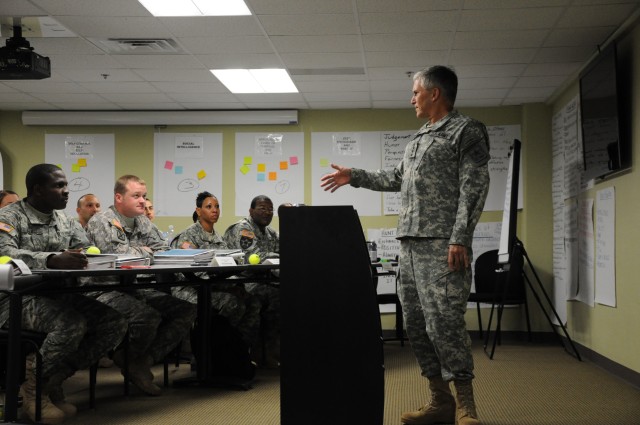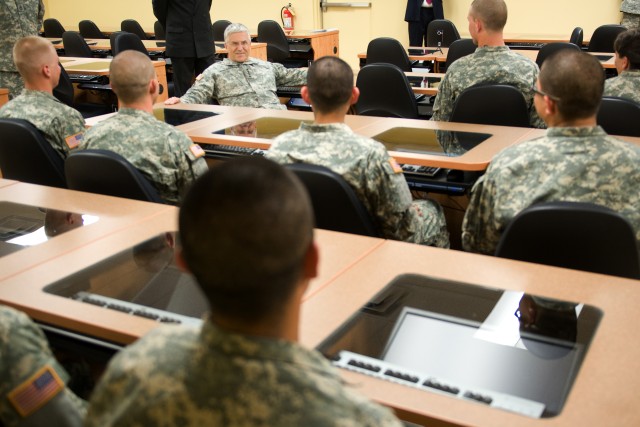FORT JACKSON, S.C. (April 12, 2010) -- Army Chief of Staff Gen. George W. Casey Jr. got a first-hand look at the Army's latest addition to the Comprehensive Soldier Fitness program and said he liked what he saw.
Casey, touring the Master Resilience Training school here, said he believes the facility will be a mainstay at the Army Initial Entry Training Center for quite some time, simply because there is a need for it.
"It was clear to me after my time in Iraq that we're going to be at this for a while; and (that) the human mind and body weren't made to deal with repeated combat deployments," said Casey, who had been the Multi-National Force commander in Iraq. "And so we had to give every Soldier the opportunity and the skills to deal with those challenges."
Casey toured the facility, which opened last week, and took time to speak with Soldiers who are attending the course's pilot class.
"I was very pleased with what I saw here," Casey said. "This will be the center of excellence for resilience training in the Army."
Master Resilience Training is one of the four components of the Comprehensive Soldier Fitness program, which is designed to improve Soldiers' social, emotional, physical, spiritual and family strength. The program has been in the works for almost two years. It also includes the Global Assessment Tool, online self-development modules and sustainment resilience training throughout a Soldier's career. To date, more than 500,000 of the Army's 1.1 million Soldiers have completed the GAT, a confidential self-assessment survey.
"That's a significant step for us all," Casey said. "The resilience skills are important for the long-term health of this Army and sustaining this all-volunteer force over the long haul."
Casey said Soldiers will be involved in Comprehensive Soldier Fitness throughout their entire careers, starting in Basic Combat Training. He toured Fort Jackson's GAT facility, where almost 50,000 Soldiers will complete their initial GAT this year. In addition, Casey was briefed on the revamped Basic Combat Training Program of Instruction by Lt. Gen. Mark Hertling, TRADOC's deputy commander for Initial Military Training.
The new POI calls for two hours of resilience training.
"As we're getting some of the young Soldiers from society, we're finding that some of the things they may see in deployments or overseas assignments are pretty traumatic," Hertling said. "I think we have to train them to be prepared for that."
Given the right tools, Soldiers returning from deployment can draw on those experiences to grow on a personal level, Casey said.
"A lot of people think that everyone ... [who] goes to combat gets post-traumatic stress. Everyone gets stress, believe me, but the vast majority of people ... [who] go to combat have a growth experience," he said. "People ... [who] experience hard things and survive and persevere are stronger as a result. (Comprehensive Soldier Fitness) is about giving all our Soldiers the skills they need to succeed."
Casey said the goal is to have a master resilience trainer in every Army battalion at the end of the year. The trainers are tasked with teaching resilience to their units, which Casey said he hopes will create momentum for the program.
"I think by the end of this year, we're going to start getting traction; and I think we'll build on that for the coming year," he said.
Casey admitted that developing a way to measure the success of the program is still a work in progress.
"That is something that we're wrestling with very hard right now," he said. "You can look at outcomes. Ideally, we'd like to see things like divorces and suicides go down, but it's hard to make a direct correlation between (Comprehensive Soldier Fitness) and those events."
He said he hopes Comprehensive Soldier Fitness will eventually lead to a culture in the Army that approaches physical and mental fitness with the same vigor.
"My expectation for this is that it's gradually embraced by the Army and becomes part of our culture," he said. "Just like we talk about physical fitness and maintaining an appropriate level of physical fitness, I expect our discussions about mental fitness to be open and frank and to contribute to our definition of what success is."




Social Sharing